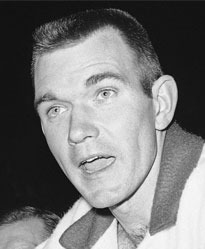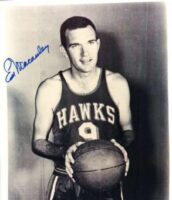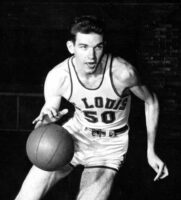Inductees
“Easy” Ed Macauley

March 22, 1928—November 8, 2011
“At 19, he looks like an overgrown altar boy." - Time magazine on Macauley's appearance.
Ed Macauley glided down the lanes of the NBA for easy layups and precise hook shots, frustrating many of the game’s greatest big men.
A phenomenal player under Hall of Fame coach Ed Hickey at St. Louis University, Macauley was everyone’s All-America. “Easy Ed” started his 10-year NBA career with the St. Louis Bombers, played six seasons with the Boston Celtics, and in 1956, as a result of a trade that included the draft rights to Bill Russell, joined the St. Louis Hawks, winning a championship in 1958.
In the first-ever NBA All-Star Game in 1951, Macauley scored 20 points to go along with six rebounds and was named MVP. His efforts also landed him on the All-NBA First Team three years in a row starting in 1951. In 10 seasons of pro ball, Macauley averaged double figures in points all but one season. At age 32, Macauley became the youngest person ever enshrined into the Basketball Hall of Fame.
Macauley was voted the national college basketball player of the year in 1949 and the most valuable player in the NBA’s first All-Star Game in 1951. The second-highest-paid player in the NBA in the early 1950s, he made the all-star team in 7 of his 10 pro seasons.
But perhaps he made his greatest impact on basketball history by being traded by the Boston Celtics in 1956 at the height of his powers for a man who had not yet played a single game in the N.B.A.: Bill Russell.
Russell went on to revolutionize the game as one of its most dominant centers and led the Celtics to 11 league championships. But Macauley’s new team, the St. Louis Hawks, also got its money’s worth: the Hawks lost to the Celtics in the finals the next year, then won it all in a rematch in 1958.
Macauley was a slender 6-foot-8-inch center and forward known for his hook shot and deft passing. In the final game of the ’58 championship, he scored only 2 points but jokingly took credit for the victory, pointing out that the margin was one point. (The Hawks, who won in six games, were helped by the fact that Russell had a sprained ankle that kept him out of two games.)
Macauley’s laid-back manner was often assumed to be the reason he acquired the nickname Easy Ed. The name stemmed from his sophomore year at Saint Louis University, where he was a star on its basketball team. Appointed captain for a game, he led the team from the basement locker room.
“But nobody followed me when I ran down the court and made a layup,” he said in 2003. “Then I heard people shout, ‘Take it easy, Ed.’ I didn’t realize it, but they were playing the national anthem.”
Macauley went on to coach the Hawks from 1958 to 1960, compiling a 89-48 record, while also serving as the club’s vice president. In 1960, at age 32, he was inducted into the Basketball Hall of Fame, and he still holds the record for the youngest player to be admitted.
In high school, during his senior year, he was recruited by Kentucky, Boston College, and others, choosing St. Louis.
In college, he immediately drew national attention. “At 19, he looks like an overgrown altar boy,” Time magazine said.
Macauley was drafted by the struggling St. Louis Bombers, who had stayed in business just for the chance of acquiring him, Life magazine reported. He had a good rookie year, but the Bombers folded anyway. The New York Knicks tried to buy the Bomber franchise for $50,000 to get him, but the NBA vetoed the deal. Macauley ended up going to Boston in a special draft. He, Bob Cousy, and Bill Sharman gave life to the struggling franchise.
In 1956 the Hawks sought to use their No. 1 draft choice, Russell, from the University of San Francisco, in a trade for Macauley and Cliff Hagan, who had been in the military and went on to be a Hall of Famer. The Celtics owner Walter Brown balked at first. But Macauley told him he would welcome the chance to return to his native St. Louis to care for a disabled son.
Brown wrote Macauley, saying: “What this means for the Boston Celtics, God only knows. You have heard me say many times that as long as I have Ed Macauley, I have a ball club. Well, now I don’t have Ed Macauley. This is the hardest letter I ever tried to write.”
Macauley played three seasons in St. Louis. His career average was 17.5 points in 641 regular-season games and 13.8 in playoff games.
His slender build did not diminish his defensive prowess. In winning the M.V.P. trophy in the all-star game, he held the 7-foot star George Mikan of the Minneapolis Lakers to 4-for-17 shooting. Mikan’s $20,000 salary was the only one that exceeded Macauley’s $17,500.

